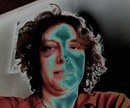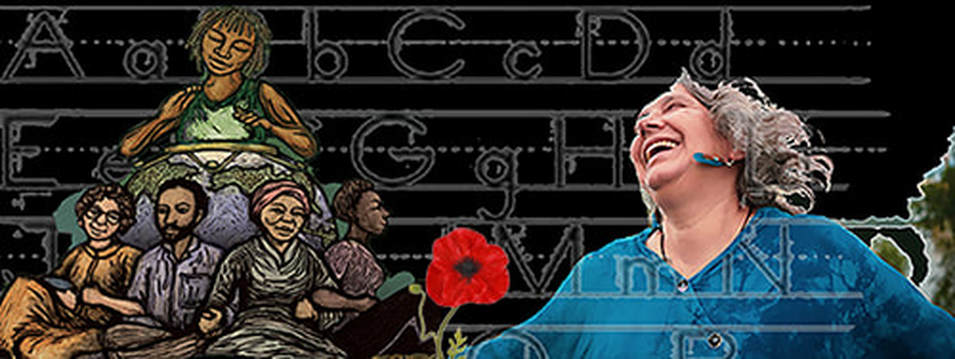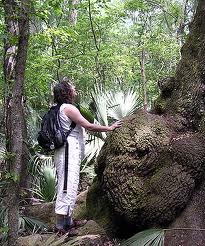 When I was a child the world was full of unusual things, astonishing realities. Just the thought that we were part of a galaxy which was one of millions, a speck of life in a vast expanse of space, made me shiver and sometimes kept me up at night. As a child you are both shocked by reality and take for granted that it's strange. That caterpillars wind themselves up in silk thread, dissolve their own bodies and remake themselves into butterflies. That blood races around inside our bodies. That people organize wars. Or insert parts of their bodies into other people's bodies and this results in new people. My brother and I thought that as we moved through the world, we left energy trails behind us and that at the end of life, it would be like letting go of one end of a stretched rubber band---we'd go flying backwards along the path we'd traveled, only a lot faster--which is why we took care not to tangle our trails around lampposts our other people. We didn't want to get bruised. So the fact that the flicker of sunlight through trees could make me feel like I was lifted out of my body, or those moments when time seems to slow to an excruciating crawl, my mouth was flooded with a taste like sucking on key chains, and I could move, didn't seem worth mentioning. Or those other flickers of consciousness, that feeling of having just arrived, just gotten back without any memory of leaving. The odd variations of my brain and body didn't seem out of place in a world with an aurora borealis or deep sea fish that dangled glow-in-the-dark blobs in front of their own mouths to catch prey.
At seventeen, when one of my close friends tells me she saw me jerking and making odd sounds, and remembering nothing about it later, it was in the context of a subculture of self-induced trances, ouija boards and spink, the imaginary drug with which we generated group hallucinations out of thin air. So it was a shock to me, to wake up on a stair landing at 23 and be told by two hastily departing Spanish students, that I'd been convulsing. I had just spent the weekend in Yosemite. Four of us had backpacked across rock strewn valleys all the way to Young Lakes, a hefty hike with a heavy load at high altitude. It was cold, the ground was hard, I didn't sleep much and ate lightly. I rose at dawn and stepped, naked, into icy water as light sprang across sky and rock faces, and then we hiked back. I was on on three limbs I now know not to go out on: intense physical exertion, sleep deprivation and low blood sugar. The next time was while I was in labor, and it changed my daughter's birth from the intended home water birth to an emergency c-section after many hours hooked up to machines in the county hospital. I was under tremendous pressure to take drugs that would have prevented me from breast feeding. But my first neurologist had said it was a low seizure threshold, not true epilepsy, and this seizure, too, had been triggered by extreme exertion, sleep deprivation and low blood sugar. So I refused. Then, ten years later, I started having them more often. I was in a stressful relationship, and I was in peri-menopause. Between 1998 and 2008 I had thirteen tonic-clonic seizures--the kind where you fall down, thrash around, pee on yourself and bite your tongue to shreds. Seven of those were in a nine-month period after my divorce. I kept careful records, and I had been tracking my menstrual cycles since my teens, so when my naturopath asked about the timing of my seizures it was easy to see that they clustered around my period. I had catamenial epilepsy, closely tied to shifting hormone levels, and the changes leading up to menopause were creating a hormonal roller coaster with neurological earthquakes. In 2005 I discovered the work of Donna Andrews and Joel Reiter. Reiter was the first neurologist I had consulted after the Yosemite-induced seizure. Donna Andrews was a woman who had had encephalitis, leading to ten seizures a day, and had learned to control them. She'd been seizure-free for 37 years and she and Dr. Reiter had a clinic where they were teaching other people to do what she did. So my family found the money and I spent five days in a hotel in Santa Rosa, California, learning to negotiate with my own brain. Based on her techniques, I was able to identify my personal danger zones--not just the common ones, but those specific to me: doing oral histories that filed my head with stories, but not having anywhere to put them; leaving Puerto Rico after a visit; too many bright colors all at once; intense excitement. I learned how to recognize and back away from the edge where my brain throws the reset switch. For me, that means sensory deprivation, visualizing balance between hemispheres, and using my own system of color-coded neurological states to calm my nervous system. Also passionflower tincture and in emergencies, a half tablet of Ativan. Since my cycles stopped, I have not had any tonic-clonic seizures. But this doesn't mean the book is closed. For one thing, my EEGs have always shown little bursts of spike and wave activity, tiny micro-seizures that don't spread, but going on all the time. I still have those little slippages of time, a fraction of a second long, noticeable only as a miniscule blur. It means my brain is still vulnerable to grand mal seizures, though I haven't had one in three years. But beyond that, is the questions of why any of this is happening at all. My doctors call it ideopathic epilepsy, meaning they don't know. But I have suspicions.
1 Comment
5/28/2013 10:26:19 pm
Some of the childhood myths feel very strange when we grew up. Your childhood experiences is felt to me like that and the writing is very interesting to read. The way you explained your story is very nice. Thank you.
Reply
Your comment will be posted after it is approved.
Leave a Reply. |
About Aurora
Aurora Levins Morales is a disabled and chronically ill, community supported writer, historian, artist and activist. It takes a village to keep her blogs coming. To become part of the village it takes, donate here. Never miss a post!
Click below to add this blog to your favorite RSS reader: Archives
September 2017
Categories
All
|


 RSS Feed
RSS Feed
